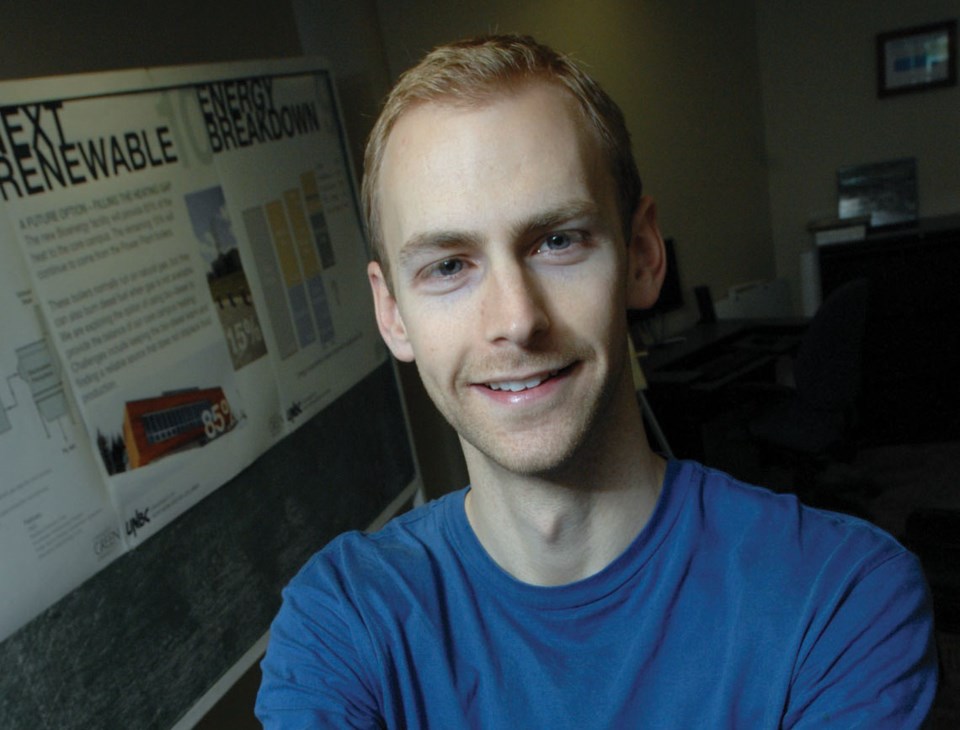Geoff de Ruiter has yet to figure out a way to make a hybrid engine run on charcoal, but give him time.
As a PhD student at UNBC researching bioenergy and biocarbon sequestration, he's already plugged in to finding economical uses for alternative energy sources, and his latest venture was an absolute gas.
On Saturday, he won a $10,000 award for the project he entered in the Northwest Wildlife Preservation Society's Youth Energy & Environment Action Program Beat the Heat contest, which challenged students to create a plan to optimize natural gas use for a greener B.C.
"Winning the contest was very satisfying, it was a very difficult and long process," said de Ruiter, a 29-year-old native of Surrey. "It was such a large amount of work to be putting in, not knowing if you were going to win anything, especially at a time I maybe should have been working on my PhD more, but it kind of worked out for me."
As one of two finalists, de Ruiter knew he would be receiving at least $5,000, to be used for education-related expenses. A cheque for twice that amount will almost eliminate his entire student loan debts. He drove to the contest for final judging at the UBC campus in a Toyota Prius hybrid gas-electric car owned by UNBC president George Iwama. The return trip cost him just $86 in fuel.
De Ruiter's contest entry consisted of three phases. The first proposal focused on the centralization of natural gas use, a project that would involve homes in the Lower Mainland and Vancouver Island utilizing heat pumps drawing from a single source in a centralized location. That would resulting in cleaner, more economical energy usage, with the side benefit of a cogeneration plant that would use excess heat to produce electricity, to be sold back to the power grid. The system could be utilized in condominium developments, hospitals, high schools, colleges or shopping malls.
Two other components of his submission could benefit residents of colder climates, like that of north central B.C. One of his ideas is to harness the heat of wastewater and use it to warm the flow of freshwater feeding heat-on-demand hot water systems.
"The problem in the North is we have such cold water, the on-demand system can't heat the water fast enough," said de Ruiter. "Down on the coast, their water is 12 or 15 degrees and ours is six degrees -- that's frigid. But if you pre-heat your water with the shower outflow and your sewage going out, you recover that heat and it goes into your on-demand hot water, and it should work."
The third segment of his project proposes creation of a green energy bond to coincide with the province's Pay As You Save financing model, which would allow homeowners in B.C. cities to invest in energy efficiency improvements through loans to be repaid on their utility bills. No upfront payment is required and participants would save money on their energy bills roughly equivalent to the amount needed to repay the loan. The program is now available in Nelson and de Ruiter wants to see it offered in Prince George.
"We have so many older homes in the Bowl that are inefficient and need energy retrofits and upgrades," de Ruiter said. "Insulation is the biggest thing we can do right now that will make us more efficient and use less natural gas or electricity. People need funds for this, and this is a municipality-run initiative to give homeowners access to low-interest loans."
De Ruiter, who holds an undergraduate degree in biology/microbiology at UNBC, is against using natural gas as a primary energy source. He would rather promote sustainable alternatives that don't produce greenhouse gases and won't adversely affect wildlife and freshwater supplies.
"In my opinion, we shouldn't be pursuing natural gas," he said. "If your priorities are to make energy for everyone, it doesn't matter about the environment, you just make energy form whatever source you have. But if your priority is to curb climate change and to clean up the environment and provide a stable longterm energy supply, then you should go with renewables."
De Ruiter says the amount of coal being exported out of the province is equivalent to the entire output of greenhouse CO2 gas emissions B.C. creates every year. He said if those coal exports were taxed, that money could be used on projects to develop solar heating, air-source heat pumps, ground-source heat pumps, on-demand hot water and wind-powered electricity.
His doctoral research is centred on finding a way to utilize biochar to result in the greatest profit and potentially slow global warming. The charcoal-like substance is produced by superheating biomass such as wood waste in an oxygen-free chamber. He'll weigh the pros and cons of selling biochar as a less-polluting alternative to burning coal, marketing it as a pellet fuel, selling it as a heat source for cement manufacturing, or burying it in the ground as a carbon sink that safely stores the carbon and enriches the soil.



